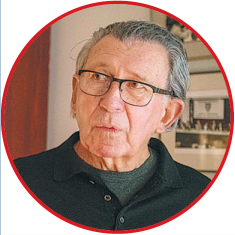
August 1939, in Medford, Oregon
EDUCATION:
1966: Bachelor's degree in journalism, University of Oregon
1975: Fellowship to study government and public policy at Washington, DC, Journalism Center
CAREER:
1966-72: Reporter and news analyst, KOIN and KING-TV, Seattle
1978-90: Mayor of Seattle
1990: Director, Harvard Institute of Politics, John F. Kennedy School of Government
1995-2006: Director, National Program Office for the Urban Health Initiative
Deng visit opened door for maritime trade

When Deng Xiaoping visited Seattle in early 1979, right after China and the United States established diplomatic relations on Jan 1 that year, Charles Royer was beginning his second year as mayor of the northwestern US city.
"It scared me to death when I got a call from Washington, DC, as a brand-new mayor," Royer said. "I got a call from the State Department. They said, 'You cannot talk to anybody about this, but Deng Xiaoping from China is going to visit four cities in the United States, and Seattle is one of them. And he will be here probably in the early part of this year.' They called me in January. Deng came in February. So we had a month to get ready.
"It was kind of a nightmare, when we were just starting out, brand-new people in the office. But people involved loved the idea of being able to host, along with the other three big cities in the US, the new leader of China.
"The new leader of China, who had already articulated what he called the 'new Long March', which was a dramatic effort on the part of Deng, the pragmatic leader, to bring China forward into the 21st century, and by golly, it happened.
"The arrival of Deng was pretty exciting. There wasn't a huge crowd. It was very personal and impressive."
Deng visited four major US cities: Atlanta, Washington, Houston and Seattle, which was the last stop. Deng's Boeing 707 plane landed in Seattle on the evening of Feb 3, 1979.
Deng wowed the crowd at a large hotel luncheon, toured a Boeing 747 plant in nearby Everett and impressed people with his humor at an intimate dinner with business and political leaders.
Unfortunately, Deng caught a bad cold and had to cancel other events planned for him during his 40-hour stay in the city.
"He was a small man but very charismatic, very imposing," Royer, now 79, said, comparing Deng's visit to Seattle to one by the United Kingdom's Queen Elizabeth II in 1983.
"He was one of the best political people I have ever seen with the crowd. I don't know how he did when he was home. Here he was a very popular guy when he got out in the crowd, with a sense of humor and very easy with people."
Soon after Deng left Seattle, a ship entered Shanghai harbor on March 15, 1979. It was the SS Letitia Lykes, the first US-flagged ship to call on China since 1949.
A month later, the MV Liu Lin Hai, docked at the Port of Seattle's Pier 91 at Smith Cove. It was the first visit in 30 years by a ship from the Chinese mainland to the US.
"In 1971 there was almost no trade between China and the United States. Instantly, almost with Deng's visit, everything opened," Royer said.
He said Senator Warren Magnuson, who represented Washington state, and Seattle lawyer Stan Barer, who had once worked on Magnuson's staff, played an important role in supporting legislation that helped maritime commerce between the US and China resume, at a time when many in the US were wary.
"Those two guys were very important in making it possible to improve the relationship with China," Royer said. "Then to overcome a very difficult past, the key I think for me is Deng Xiaoping's visit to the US.
"Ever since then, the trade numbers between the US and China grew exponentially. Suddenly, Washington state was the No 3 trade partner of China, behind California and Texas. That was a dramatic turnabout, to the benefit of both countries."


